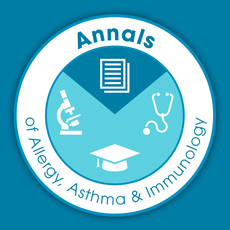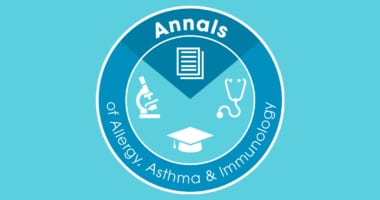 The year is rapidly drawing to a close. Holiday preparations abound, and we are all looking forward to the new year. Many of us are thinking about how we can operate our practices more efficiently, take better care of our patients and enjoy what we do even more in 2019 than we have this year. For many of us, we are anticipating a bit of downtime mixed in with bustling activity over the next several weeks. I hope you will save some time to spend with your print or online copy of the December issue of the Annals of Allergy, Asthma and Immunology. This issue is dedicated to addressing challenges that occur in many of our offices. I want to call your attention to two articles in particular.
The year is rapidly drawing to a close. Holiday preparations abound, and we are all looking forward to the new year. Many of us are thinking about how we can operate our practices more efficiently, take better care of our patients and enjoy what we do even more in 2019 than we have this year. For many of us, we are anticipating a bit of downtime mixed in with bustling activity over the next several weeks. I hope you will save some time to spend with your print or online copy of the December issue of the Annals of Allergy, Asthma and Immunology. This issue is dedicated to addressing challenges that occur in many of our offices. I want to call your attention to two articles in particular.
The first is an MOC CME review from David Tapke, MD, Rebecca Scherzer, MD, and Mitchell Grayson, MD, FACAAI, from Ohio State University that very nicely discusses unnecessary food allergy testing by primary care providers. They tackle the ethical considerations incumbent upon us in our dual role as both patient advocates for those who have come to us for care and as specialists fostering collegiality and cooperative spirit for our colleagues who may refer these and other patients to us for care. This goes beyond just potentially offending colleagues – it can impact best practices or even patient safety. For example, when deciding what to do for a patient prescribed a broad (and unnecessary) food elimination diet because of the results of a large, food-specific IgE panel. The authors provide a thoughtful, reasonable outline to suggest possible actions necessary by allergists in such situations.
Another article that should provoke readers to deeper thought is from an expert group led by Timothy Craig, DO, FACAAI, from Penn State regarding the issue of prophylaxis versus on-demand therapy for hereditary angioedema (HAE) patients with C1-inhibitor deficiency. The authors provide an excellent overview that includes historical considerations for development of current criteria aimed at establishing thresholds of disease activity that would prompt providers to recommend prophylactic therapy. They address the balance of benefit to the patient: quality of life and other morbidity measures versus the potential economic burden that would likely preclude a generalized prophylactic recommend for all HAE patients. The article emphasizes the need for regular monitoring by experts like us who have the training and experience to make the most useful and sustainable recommendations to these patients and payers.
I hope you will take time to view these and other feature in this month’s Annals in between festive events this month. We welcome feedback and commentary on articles you find of interest. Others can benefit from your opinions and perspectives. Feel free to email them to me directly.
Gailen D. Marshall Jr., MD, PhD, FACAAI
Editor-in-chief

